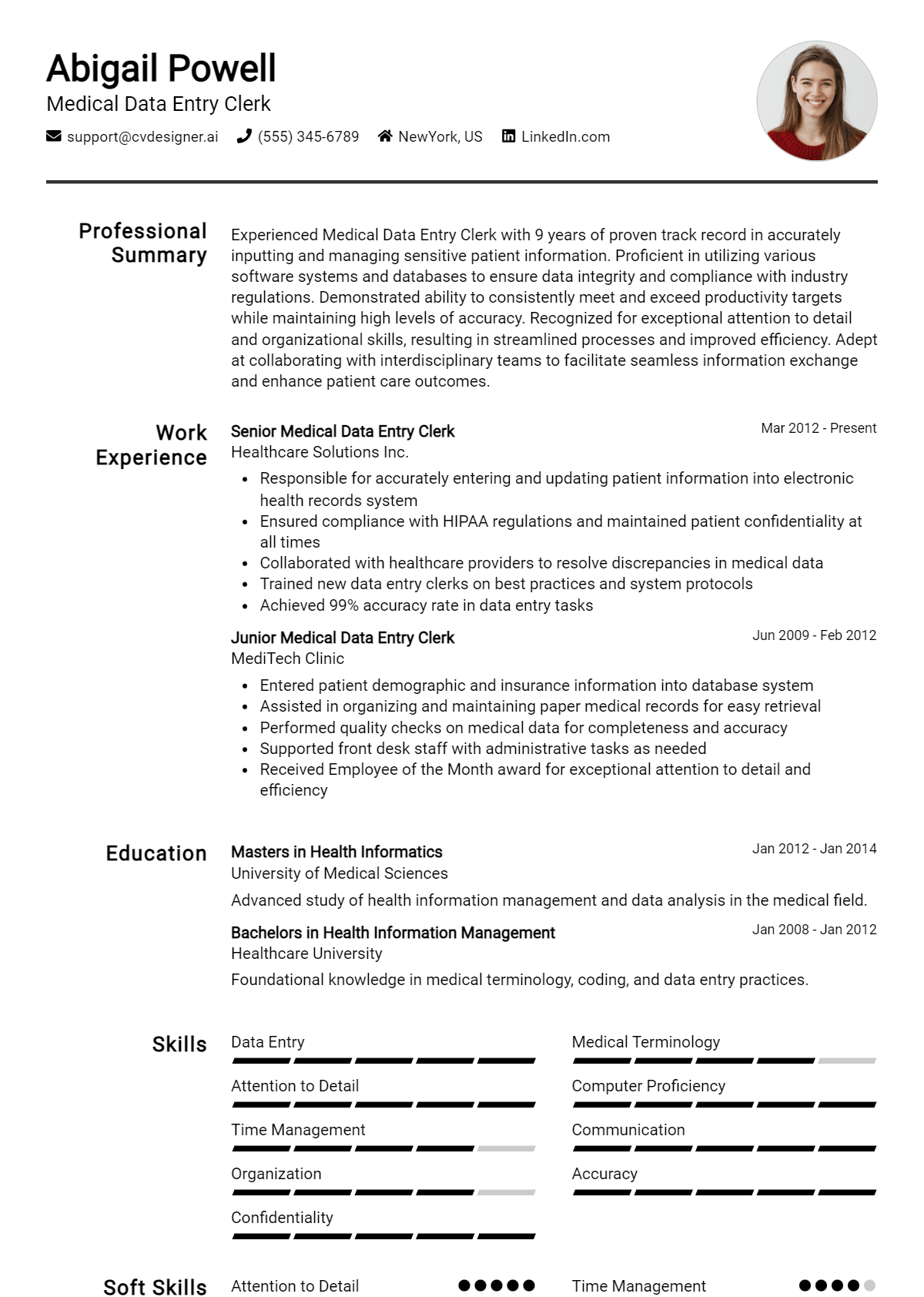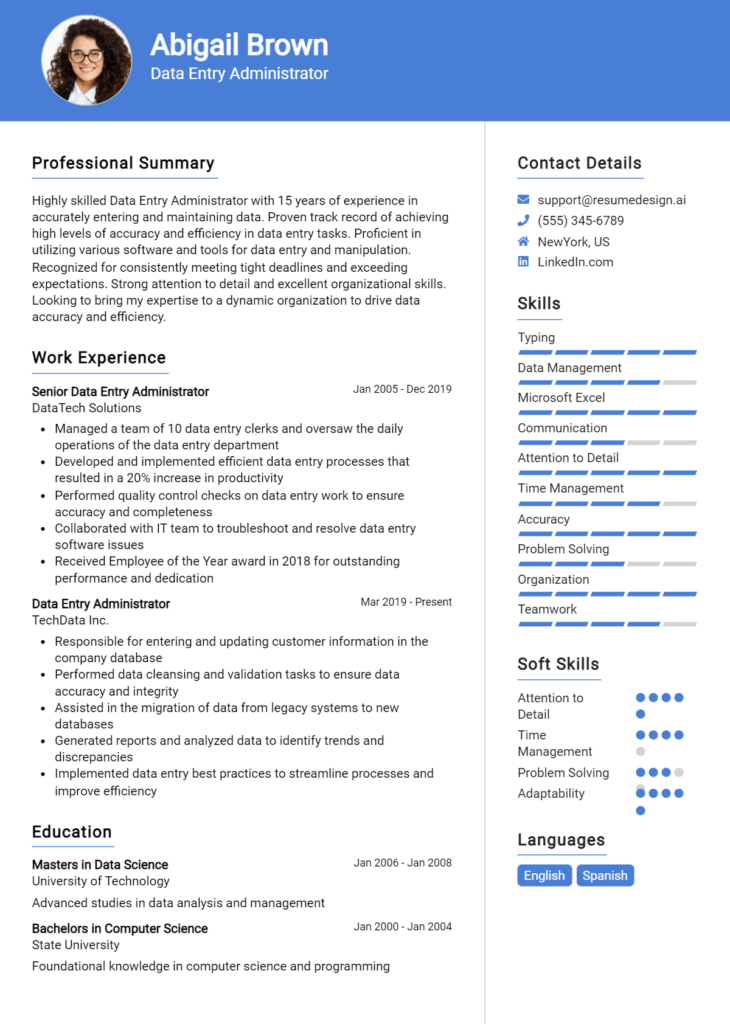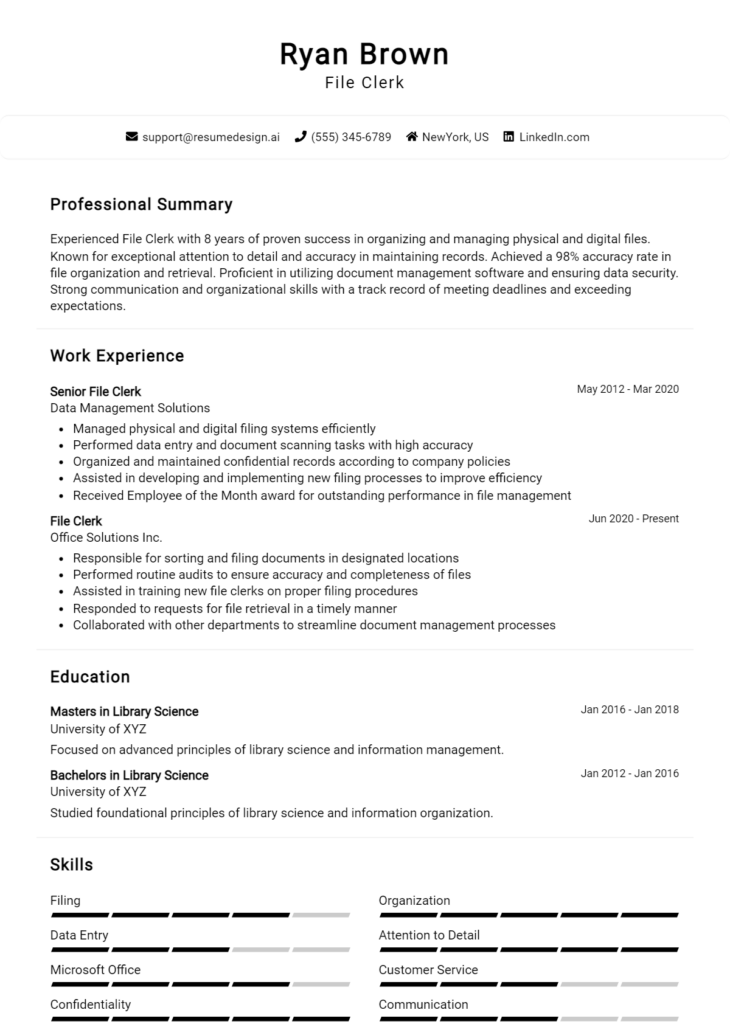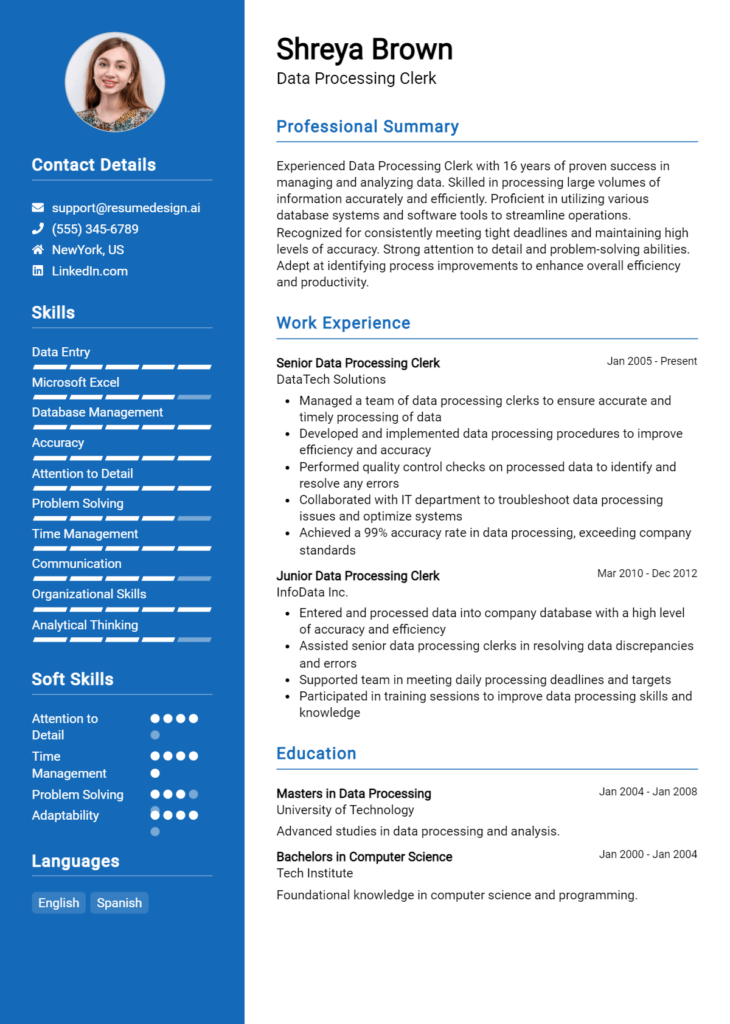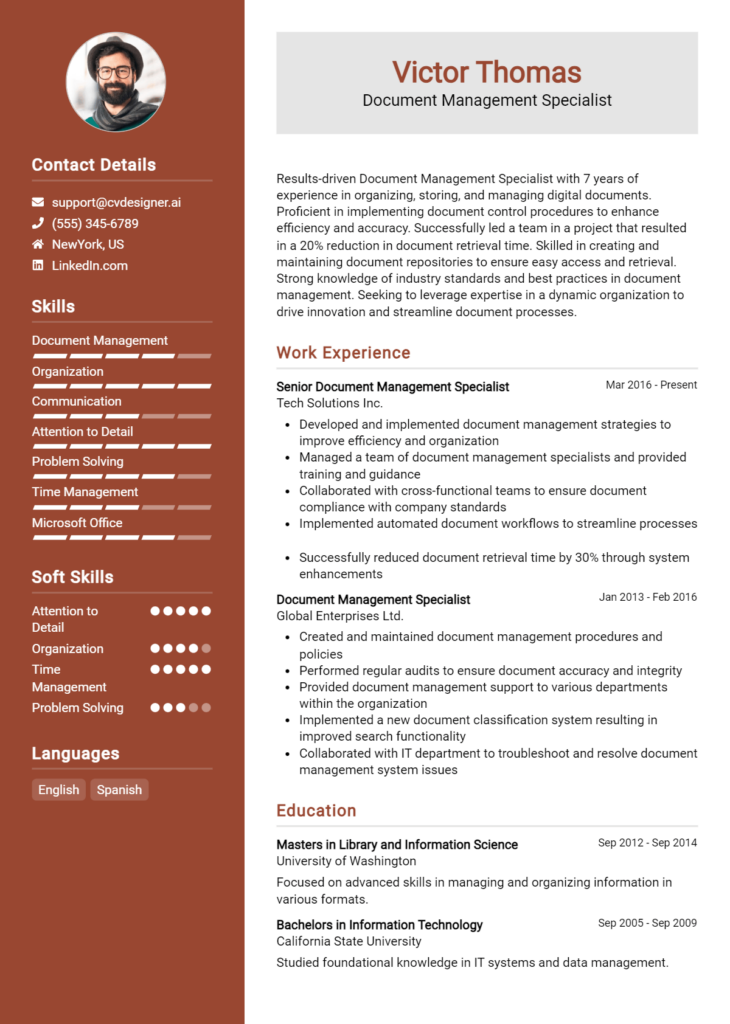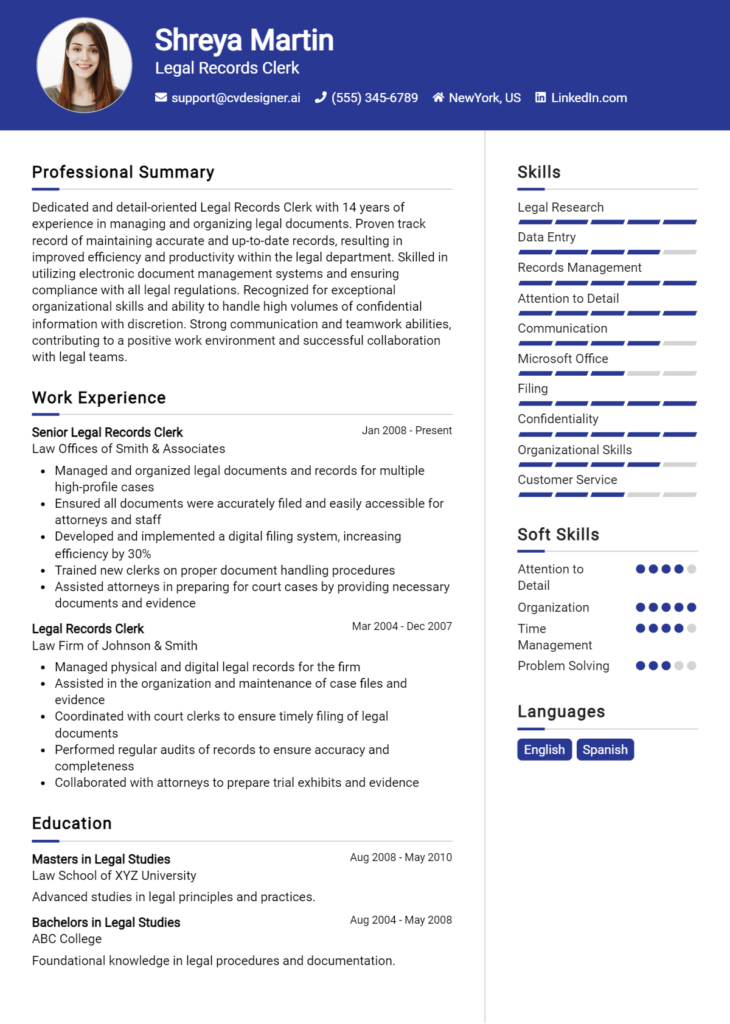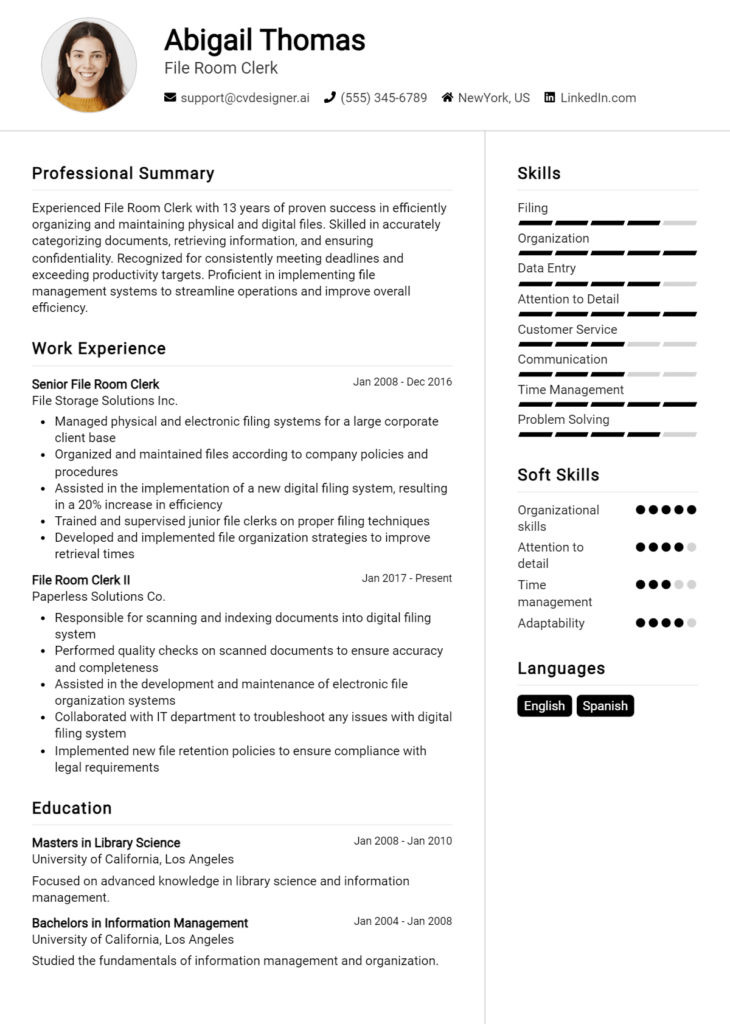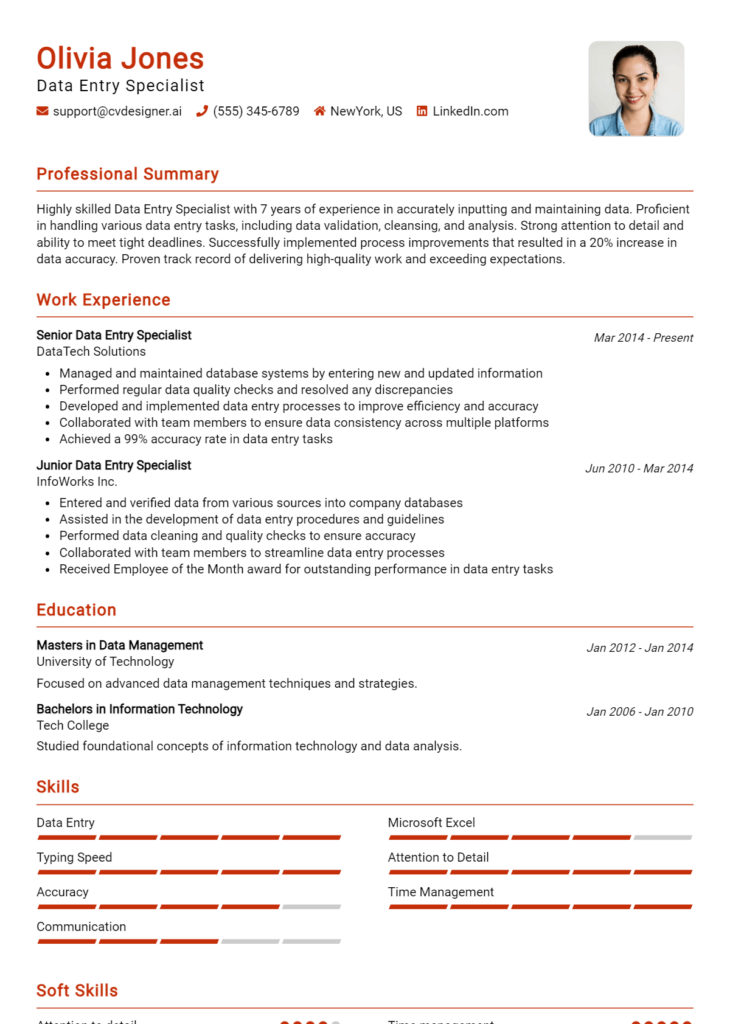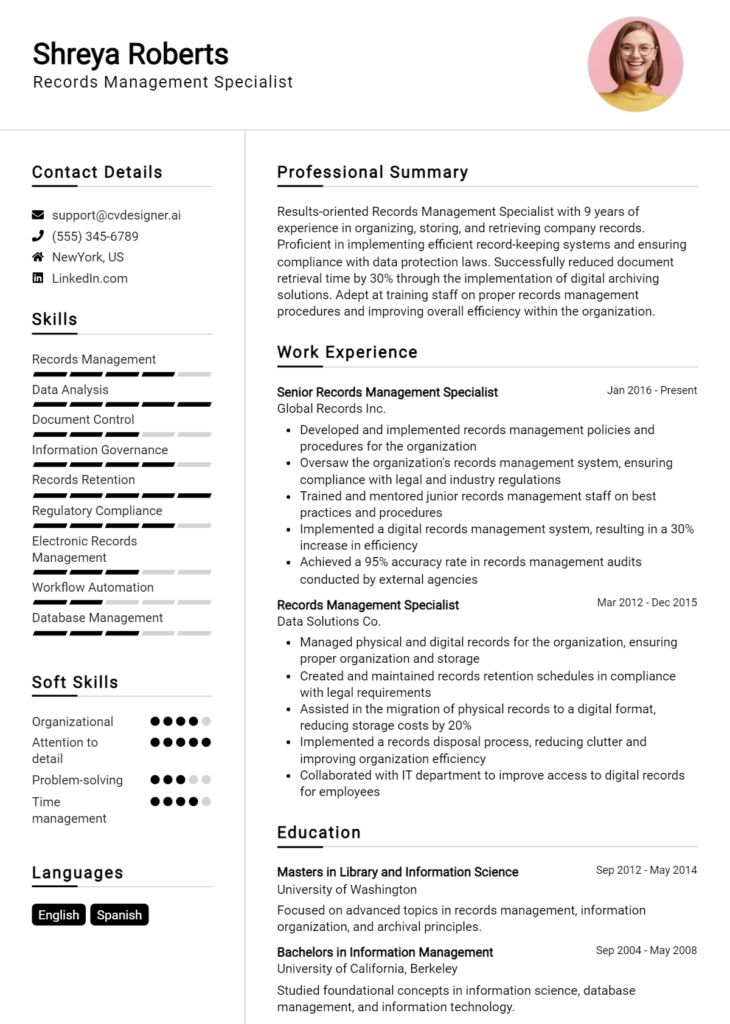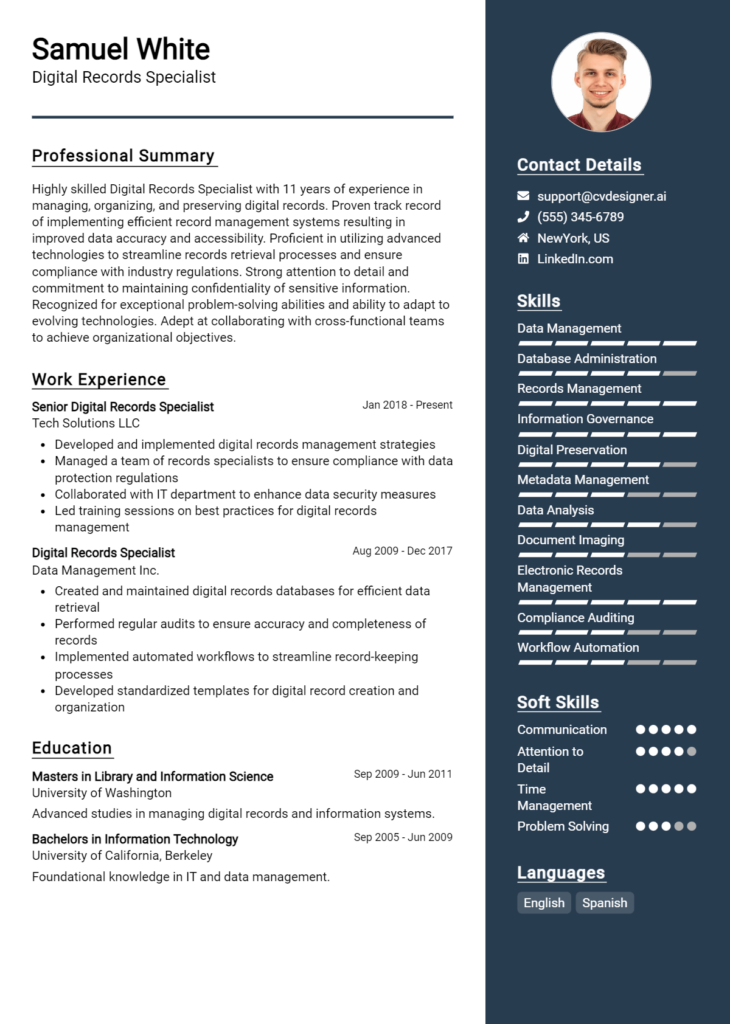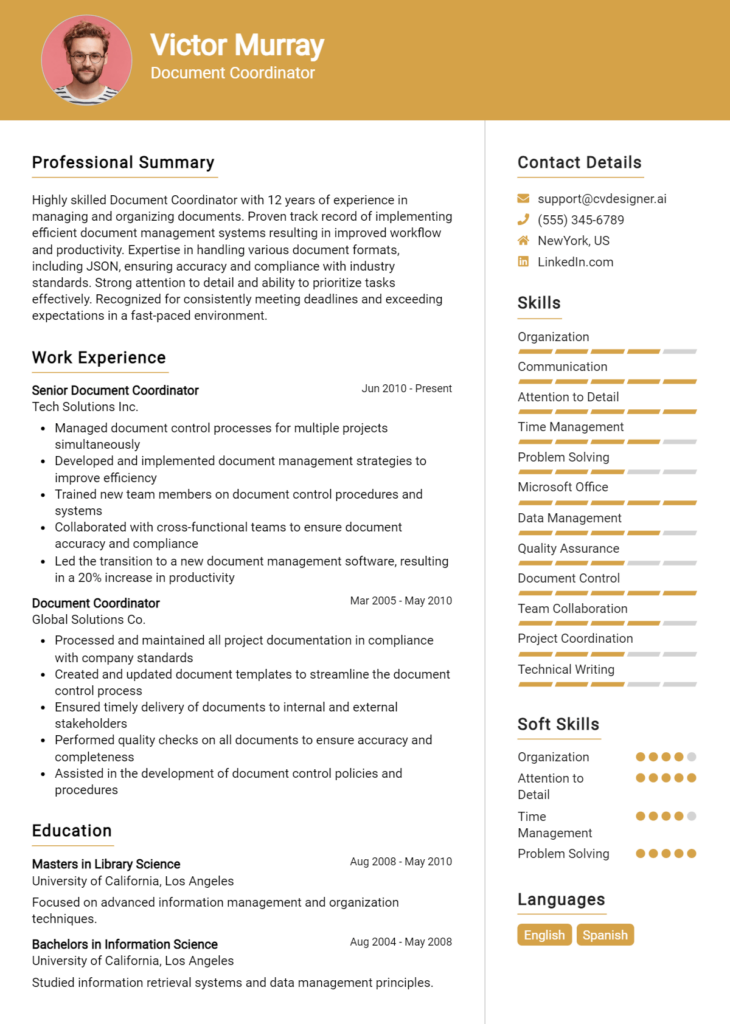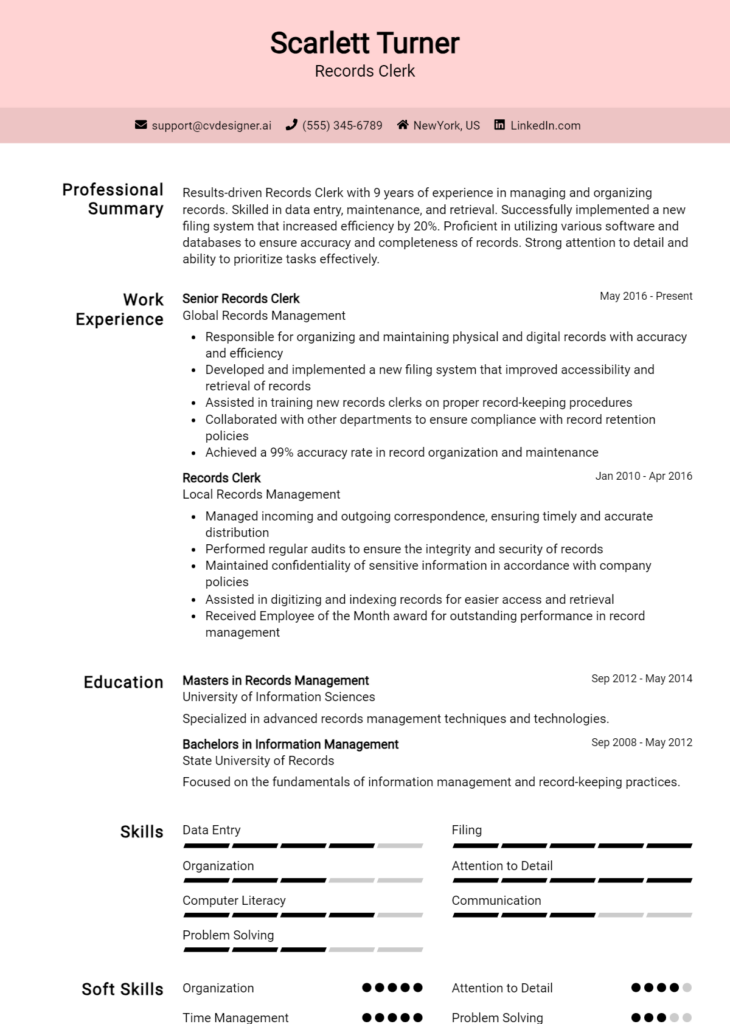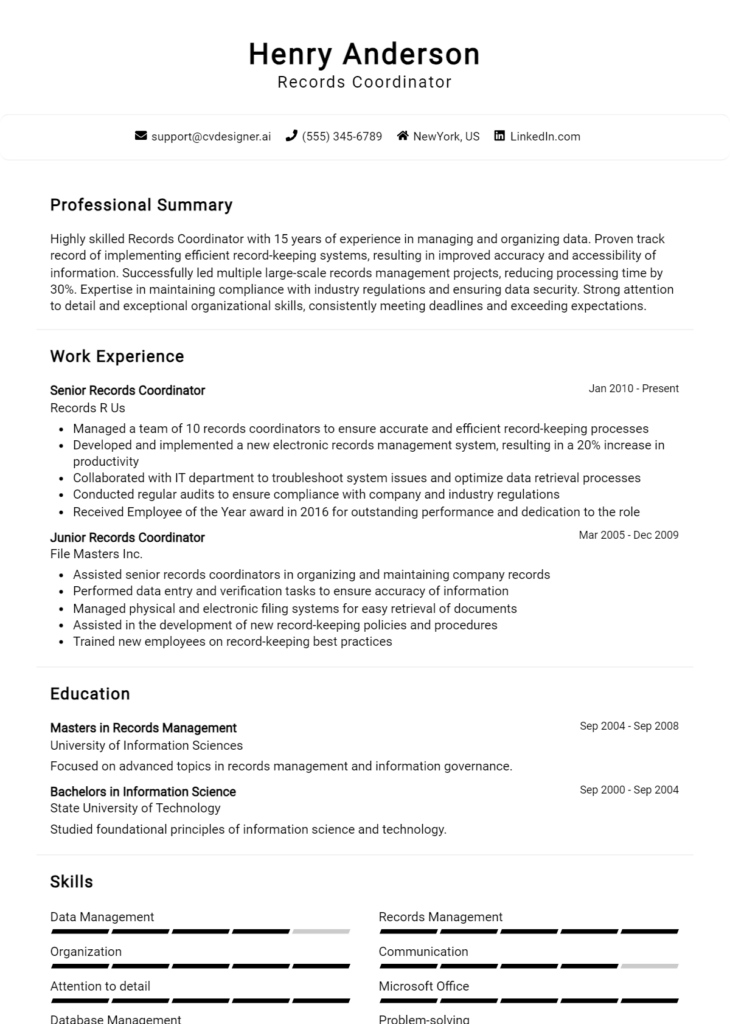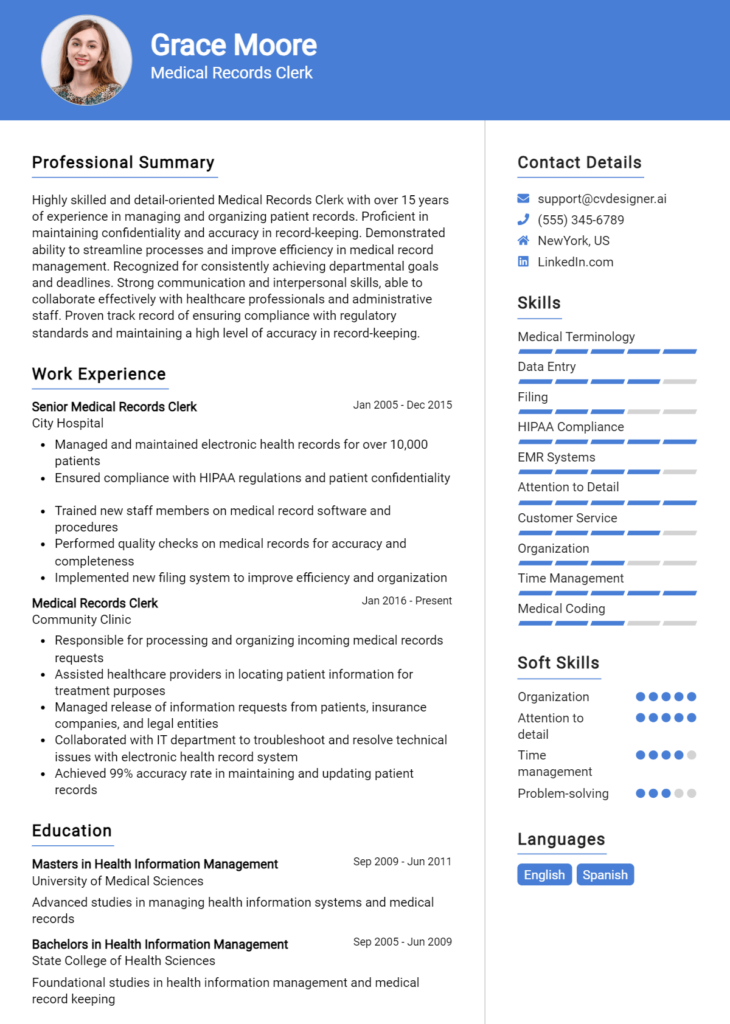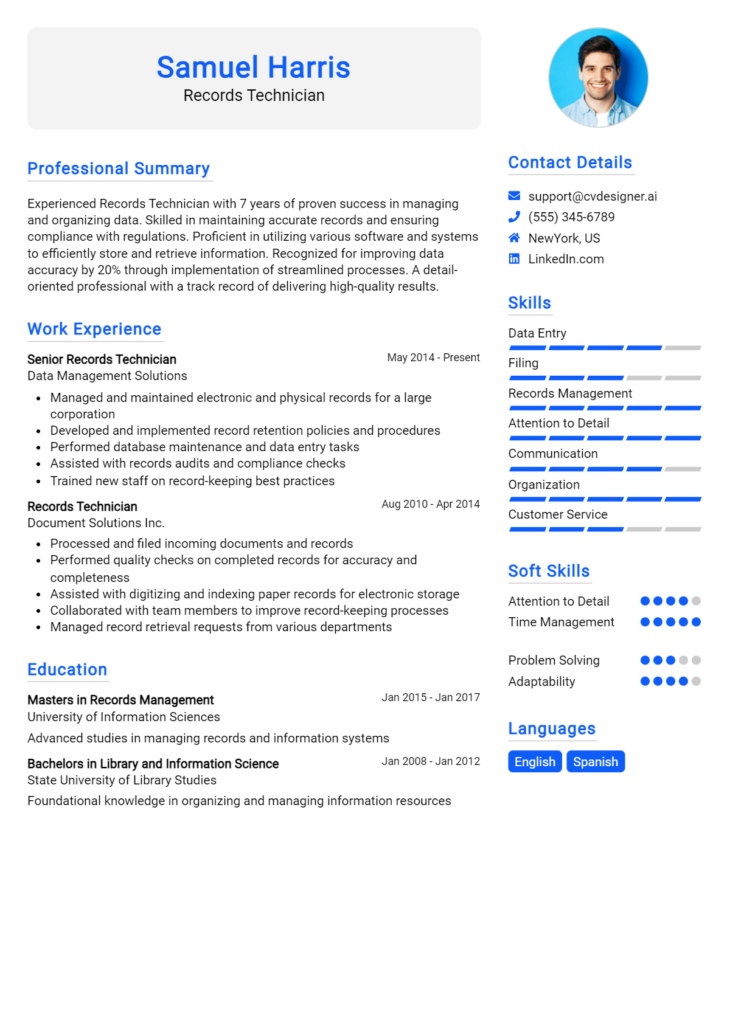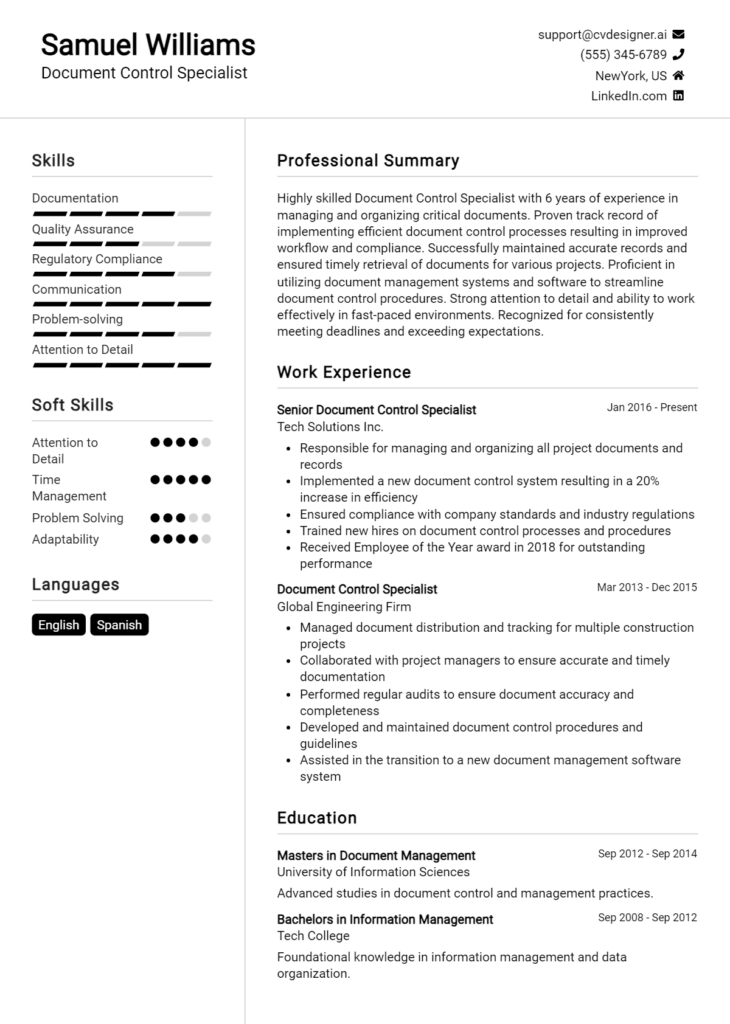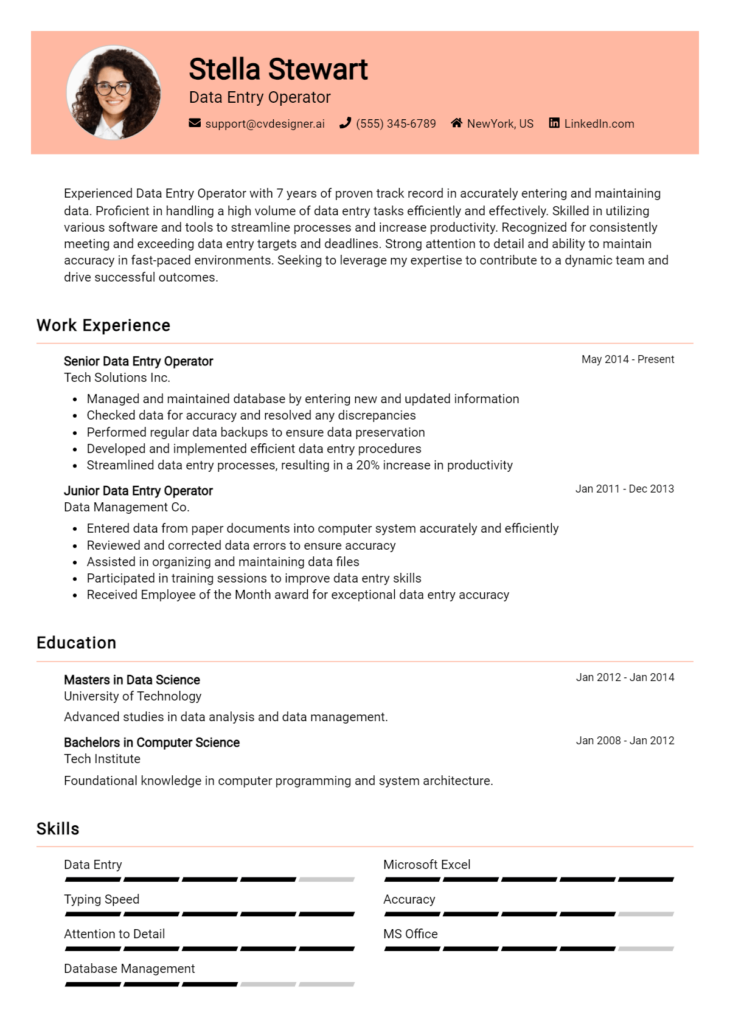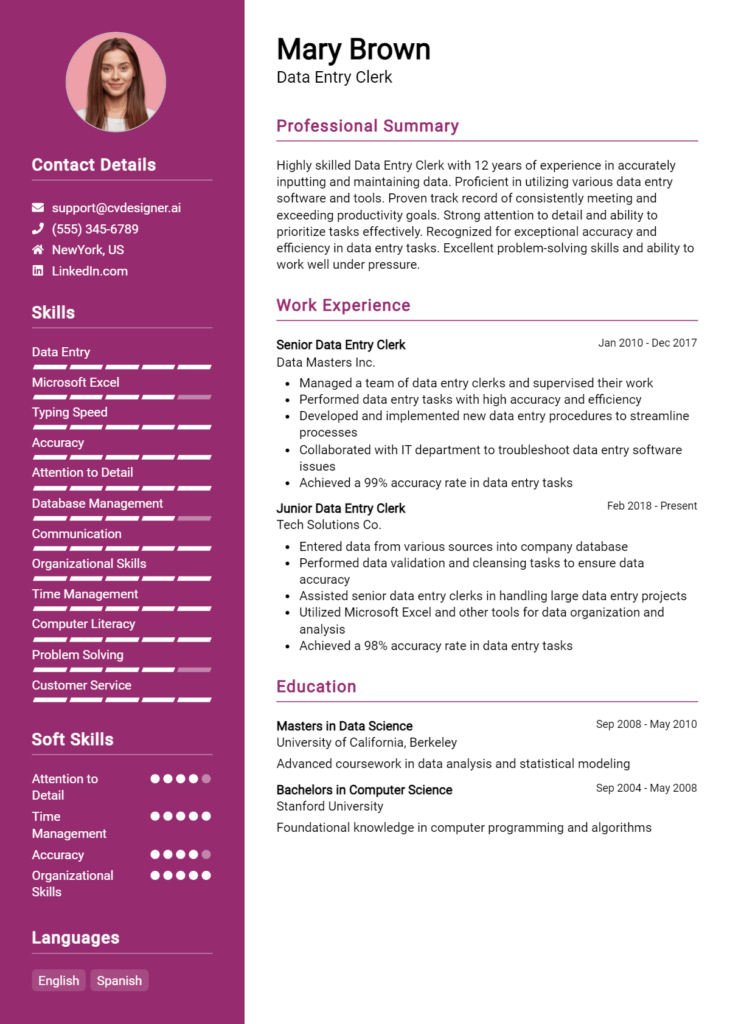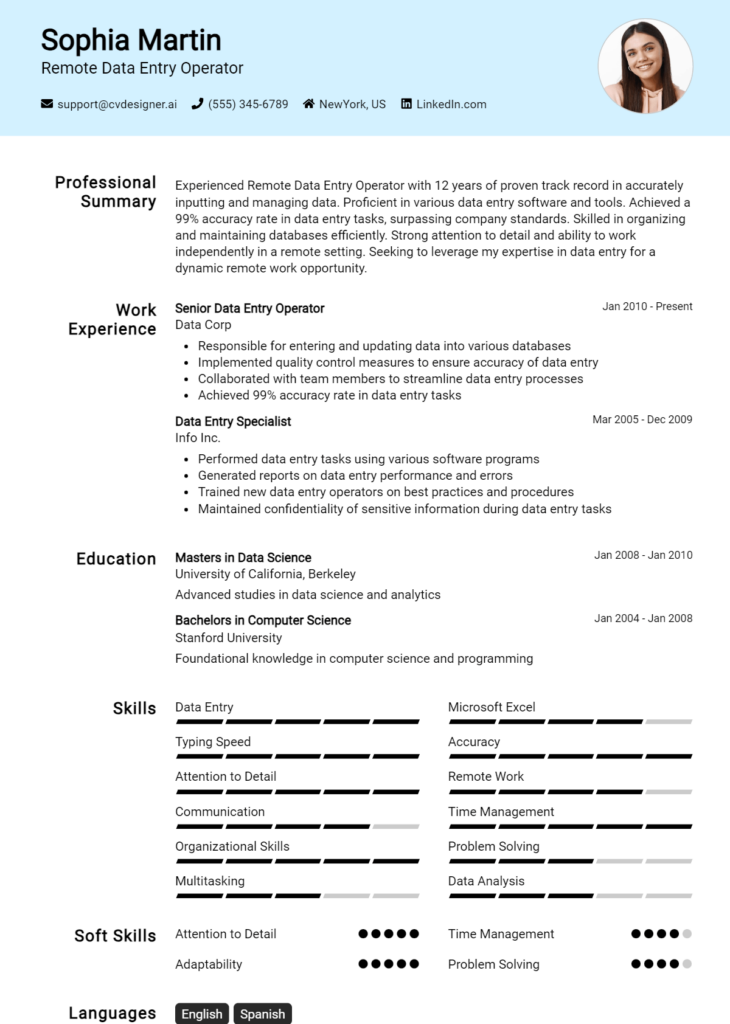Medical Data Entry Clerk Core Responsibilities
A Medical Data Entry Clerk plays a crucial role in the healthcare system, serving as a vital link between various departments. Key responsibilities include entering patient information, maintaining accurate records, and ensuring data integrity across platforms. Essential skills involve technical proficiency with database software, operational understanding of medical terminology, and strong problem-solving abilities. These competencies are fundamental in enhancing organizational efficiency and patient care. A well-structured resume effectively highlights these qualifications, showcasing the candidate's capacity to contribute to the organization's goals.
Common Responsibilities Listed on Medical Data Entry Clerk Resume
- Accurately inputting patient data into electronic health records (EHR) systems
- Reviewing and verifying data for accuracy and completeness
- Maintaining confidentiality of sensitive patient information
- Updating and organizing medical records as necessary
- Assisting healthcare professionals with data-related inquiries
- Generating reports to support clinical and administrative functions
- Collaborating with various departments to streamline data processes
- Participating in data audits to ensure compliance with regulations
- Training new staff on data entry protocols and software
- Identifying and resolving discrepancies in patient records
- Utilizing medical coding and terminology to categorize information
- Maintaining an organized filing system for physical records
High-Level Resume Tips for Medical Data Entry Clerk Professionals
In the competitive field of medical data entry, a well-crafted resume is not just a formality; it is often the first impression a potential employer will have of a candidate. A resume serves as a powerful marketing tool that showcases an applicant's skills, achievements, and professional journey. For Medical Data Entry Clerk professionals, it is crucial that the resume reflects not only the technical abilities required for the role but also any relevant accomplishments that demonstrate proficiency and dedication. This guide will provide practical and actionable resume tips specifically tailored for Medical Data Entry Clerk professionals to help them stand out in the hiring process.
Top Resume Tips for Medical Data Entry Clerk Professionals
- Tailor your resume to the specific job description by incorporating keywords and phrases from the posting.
- Showcase relevant experience, emphasizing positions that involved data entry, record management, or administrative duties in a medical setting.
- Quantify your achievements where possible, such as the number of records processed per day or accuracy rates.
- Highlight industry-specific skills, including knowledge of medical terminology, electronic health records (EHR) systems, and data privacy regulations.
- Include certifications related to medical data entry or administrative tasks to enhance your credibility.
- Use action verbs to describe your responsibilities and accomplishments, making your contributions clear and impactful.
- Keep your resume concise and focused, ideally limiting it to one page unless you have extensive relevant experience.
- Utilize a clean, professional format that improves readability and draws attention to important information.
- Consider adding a summary statement at the top of your resume that highlights your key qualifications and career goals.
- Proofread carefully to eliminate any errors, as attention to detail is critical in the medical data entry field.
By implementing these tips, Medical Data Entry Clerk professionals can significantly improve their chances of landing a job in this field. A focused and polished resume will not only showcase their qualifications effectively but also demonstrate their commitment to excellence in a role that demands precision and reliability.
Why Resume Headlines & Titles are Important for Medical Data Entry Clerk
In the competitive field of medical data entry, crafting a standout resume is essential for job seekers aiming to secure their desired position. Resume headlines and titles play a crucial role in this process by providing a succinct summary of a candidate's qualifications and expertise. A powerful headline can immediately capture the attention of hiring managers, differentiating the applicant from a sea of candidates. An effective headline should be concise, relevant, and directly tied to the medical data entry role, encapsulating key skills or experiences that align with the job description.
Best Practices for Crafting Resume Headlines for Medical Data Entry Clerk
- Keep it concise: Aim for 10-15 words to maintain clarity and impact.
- Be role-specific: Use terminology and keywords relevant to medical data entry.
- Highlight key skills: Incorporate essential skills that are in demand for the position.
- Showcase experience: Include years of experience or notable achievements when possible.
- Use action words: Start with strong verbs to convey proactivity and determination.
- Avoid jargon: Ensure the language is accessible to all readers, including HR professionals.
- Tailor for each application: Customize the headline based on the specific job description.
- Make it compelling: Use persuasive language that conveys confidence and professionalism.
Example Resume Headlines for Medical Data Entry Clerk
Strong Resume Headlines
Detail-Oriented Medical Data Entry Clerk with 5+ Years of Experience in Healthcare Settings
Efficient Medical Data Specialist Skilled in Data Management and Patient Record Accuracy
Certified Medical Data Entry Clerk with Proven Track Record in Streamlining Data Processes
Highly Organized Medical Data Entry Professional Committed to Quality and Compliance
Weak Resume Headlines
Data Entry Clerk
Experienced Worker Seeking Job
The strong headlines are effective because they provide specific information about the candidate's skills, experience, and commitment to the role, making them appealing to hiring managers. In contrast, the weak headlines fail to impress as they lack detail and relevance, making it difficult for employers to gauge the candidate's qualifications or fit for the position. A well-crafted headline not only grabs attention but also sets a positive tone for the rest of the resume, giving candidates a competitive edge in their job search.
Writing an Exceptional Medical Data Entry Clerk Resume Summary
A well-crafted resume summary is crucial for a Medical Data Entry Clerk as it serves as the first impression a candidate makes on hiring managers. This brief yet powerful section quickly captures attention by highlighting essential skills, relevant experience, and notable accomplishments related to the job role. A strong summary should be concise, impactful, and tailored to the specific position the candidate is applying for, ensuring that it resonates with the employer's needs and sets the tone for the rest of the resume.
Best Practices for Writing a Medical Data Entry Clerk Resume Summary
- Quantify Achievements: Use numbers to showcase your impact, such as the volume of data processed or error reduction percentages.
- Focus on Skills: Highlight key skills relevant to data entry, such as proficiency in medical software, attention to detail, and data management.
- Tailor for the Job Description: Customize your summary to align with the specific requirements and keywords in the job posting.
- Be Concise: Keep your summary to 2-4 sentences to maintain clarity and engagement.
- Highlight Relevant Experience: Mention previous roles or projects that are directly related to medical data entry.
- Use Action Words: Start sentences with strong action verbs to convey confidence and proactivity.
- Showcase Soft Skills: Include interpersonal skills such as communication and teamwork, which are essential in a medical environment.
- Avoid Jargon: Use clear language that is easily understood to ensure your summary is accessible to a broader audience.
Example Medical Data Entry Clerk Resume Summaries
Strong Resume Summaries
Results-driven Medical Data Entry Clerk with over 5 years of experience in managing and processing patient data with a 98% accuracy rate. Proficient in using advanced medical software, streamlining data workflows, and ensuring compliance with HIPAA regulations.
Detail-oriented professional with a proven track record of entering and verifying over 1,000 patient records daily while reducing data entry errors by 30%. Skilled in data management and adept at collaborating with healthcare teams to enhance patient care.
Dedicated Medical Data Entry Clerk with expertise in electronic health records (EHR) systems and a commitment to maintaining data integrity. Successfully implemented a new data entry protocol that improved processing speed by 20%, resulting in faster patient service.
Weak Resume Summaries
I have experience in data entry and am looking for a job in the medical field.
Motivated worker eager to contribute to a team. I am detail-oriented and have worked with data before.
The examples above illustrate the key differences between strong and weak resume summaries. Strong summaries are specific, quantifiable, and directly relevant to the Medical Data Entry Clerk role, showcasing significant achievements and essential skills. In contrast, weak summaries lack detail, fail to provide measurable outcomes, and come across as generic, making them less impactful in capturing the attention of hiring managers.
Work Experience Section for Medical Data Entry Clerk Resume
The work experience section of a Medical Data Entry Clerk resume is pivotal in demonstrating a candidate's relevant skills and contributions in the field. This section not only highlights the technical capabilities necessary for accurate data management but also illustrates the candidate's proficiency in collaborating with healthcare teams and delivering high-quality results. By quantifying achievements and aligning their experience with industry standards, candidates can effectively showcase their value to potential employers, making this section a critical component of a successful resume.
Best Practices for Medical Data Entry Clerk Work Experience
- Highlight technical skills relevant to data entry, such as proficiency in electronic health records (EHR) systems and data management software.
- Quantify achievements where possible, such as the number of records processed or the accuracy rate of data entries.
- Emphasize collaboration experiences, showcasing teamwork in managing patient information and supporting healthcare professionals.
- Use action verbs to describe your responsibilities and accomplishments, making the statements more impactful.
- Align your experiences with industry standards and best practices to demonstrate knowledge of compliance and regulations.
- Include any certifications or specialized training that enhances your technical expertise in data entry and management.
- Tailor your work experience to the specific job you are applying for by highlighting the most relevant skills and achievements.
- Showcase any leadership roles or initiatives you undertook that improved team performance or data management processes.
Example Work Experiences for Medical Data Entry Clerk
Strong Experiences
- Processed over 1,500 patient records weekly with a 99% accuracy rate, ensuring compliance with HIPAA regulations.
- Led a team of 5 data entry clerks in a project that improved data retrieval times by 30% through the implementation of a new EHR system.
- Collaborated with healthcare providers to streamline patient data entry processes, reducing entry errors by 25% and improving patient care timelines.
- Received the 'Employee of the Month' award for consistently exceeding data entry targets and enhancing team productivity.
Weak Experiences
- Responsible for entering data into the system.
- Helped the team with various clerical tasks.
- Worked on data entry projects as needed.
- Performed general office duties related to data management.
The examples are considered strong because they provide specific details about achievements, including quantifiable outcomes and clear contributions to team efforts. They emphasize the candidate's technical skills and leadership abilities, showcasing a proactive approach to improving processes. Conversely, the weak experiences lack specificity, clarity, and measurable outcomes, making them less impactful and failing to convey the candidate's true capabilities in the role of a Medical Data Entry Clerk.
Education and Certifications Section for Medical Data Entry Clerk Resume
The education and certifications section of a Medical Data Entry Clerk resume plays a crucial role in showcasing a candidate's academic background and commitment to professional development. This section highlights relevant degrees, industry-recognized certifications, and specialized training that align closely with the requirements of the job. By providing detailed information on relevant coursework and certifications, candidates can enhance their credibility, demonstrating not only their qualifications but also their dedication to continuous learning in a field that demands accuracy and expertise in medical data management.
Best Practices for Medical Data Entry Clerk Education and Certifications
- Focus on relevant degrees such as Health Information Management, Medical Coding, or Administration.
- Include industry-recognized certifications like Certified Medical Data Specialist (CMDS) or Registered Health Information Technician (RHIT).
- Highlight any specialized training or workshops related to medical data entry or electronic health records.
- Provide specific coursework that directly pertains to data management, medical terminology, and coding.
- List certifications that demonstrate proficiency in software commonly used in medical data entry, such as Epic or Cerner.
- Maintain clarity and organization to ensure easy readability and quick reference for hiring managers.
- Update this section regularly to reflect new certifications or relevant education that enhances your qualifications.
- Avoid including certifications that are outdated or irrelevant to the current medical data entry landscape.
Example Education and Certifications for Medical Data Entry Clerk
Strong Examples
- Associate Degree in Health Information Technology, XYZ Community College, 2022
- Certified Medical Data Specialist (CMDS), National Association of Medical Data Specialists, 2023
- Coursework in Medical Terminology, Coding, and Data Management, ABC University, 2021
- Training in Electronic Health Records Management, Online Health Training Academy, 2023
Weak Examples
- Bachelor’s Degree in Philosophy, DEF University, 2019
- Certification in Basic Computer Skills, Generic Training Institute, 2018
- Course in Creative Writing, GHI College, 2020
- Old CPR Certification, expired in 2021
The examples presented as strong are directly relevant to the Medical Data Entry Clerk role, showcasing qualifications that are essential for success in this field. They include specific degrees and certifications that demonstrate a clear alignment with industry standards and requirements. In contrast, the weak examples highlight educational credentials and training that do not pertain to medical data entry, which could detract from the candidate's credibility and relevance in the eyes of potential employers.
Top Skills & Keywords for Medical Data Entry Clerk Resume
In the competitive field of healthcare administration, a Medical Data Entry Clerk plays a critical role in ensuring that patient information is accurately recorded and maintained. Skills are paramount in this profession, as they not only contribute to the efficiency and accuracy of data management but also enhance communication with healthcare professionals and patients. A well-crafted resume that highlights relevant skills can significantly improve job prospects, showcasing a candidate's ability to thrive in a fast-paced medical environment. By focusing on both hard and soft skills, applicants can present a comprehensive picture of their capabilities, making it easier for employers to identify the right fit for their organization.
Top Hard & Soft Skills for Medical Data Entry Clerk
Soft Skills
- Attention to Detail
- Communication Skills
- Time Management
- Problem-Solving
- Adaptability
- Teamwork
- Empathy
- Organization Skills
- Critical Thinking
- Customer Service Orientation
- Dependability
- Multitasking
- Interpersonal Skills
- Conflict Resolution
Hard Skills
- Proficiency in Data Entry Software (e.g., Microsoft Excel, Access)
- Knowledge of Medical Terminology
- Familiarity with Electronic Health Records (EHR) Systems
- Typing Speed and Accuracy
- Data Analysis Skills
- Understanding of HIPAA Regulations
- Basic Coding and Billing Knowledge
- Familiarity with Office Equipment (e.g., scanners, printers)
- Database Management
- Quality Control and Assurance
- Report Generation
- Statistical Analysis
- Data Backup and Recovery Techniques
For more about essential skills and how to effectively showcase your work experience, be sure to explore additional resources that can enhance your resume.
Stand Out with a Winning Medical Data Entry Clerk Cover Letter
Dear Hiring Manager,
I am writing to express my interest in the Medical Data Entry Clerk position at [Company Name], as advertised on [Where You Found the Job Posting]. With a strong background in medical administration and data management, I am excited about the opportunity to contribute my skills and expertise to your esteemed organization. My attention to detail, coupled with my ability to work efficiently under pressure, makes me a suitable candidate for this role.
In my previous position at [Previous Company Name], I was responsible for accurately entering patient information into electronic health records (EHR) systems while ensuring compliance with HIPAA regulations. My experience has equipped me with a solid understanding of medical terminology and the importance of maintaining data integrity. I consistently achieved a data entry accuracy rate of over 98%, which helped streamline processes and enhance overall patient care. My proficiency in various software applications, including Microsoft Office Suite and [specific EHR software], allows me to adapt quickly to new technologies and contribute effectively to your team.
I am particularly drawn to this opportunity because of [Company Name]'s commitment to excellence in patient services and innovative healthcare solutions. I believe that my organizational skills and proactive approach to problem-solving will make a positive impact on your operations. I am eager to bring my background in data entry and my passion for the healthcare industry to your organization, ensuring that patient data is managed with the utmost accuracy and confidentiality.
Thank you for considering my application. I look forward to the possibility of discussing how my skills and experiences align with the needs of your team. I am excited about the opportunity to contribute to [Company Name] and support its mission of providing exceptional healthcare services.
Sincerely,
[Your Name]
[Your Phone Number]
[Your Email Address]
Common Mistakes to Avoid in a Medical Data Entry Clerk Resume
When crafting a resume for a Medical Data Entry Clerk position, it’s crucial to present your skills and experiences accurately and professionally. Many candidates inadvertently make mistakes that can undermine their chances of landing an interview. By avoiding these common pitfalls, you can enhance your resume and better showcase your qualifications for the role.
Neglecting to Tailor the Resume: Failing to customize your resume for the specific job can make it seem generic. Highlight relevant skills and experiences that match the job description.
Overloading with Irrelevant Information: Including excessive details about unrelated work experience can distract from your relevant qualifications. Focus on experiences directly related to medical data entry.
Using Unprofessional Language or Formatting: A lack of professionalism in language or a cluttered format can create a negative impression. Ensure your resume is clean, concise, and uses appropriate professional terminology.
Ignoring Important Keywords: Many employers use applicant tracking systems (ATS) that screen for specific keywords. Not including relevant industry terms can lead to your resume being overlooked.
Not Highlighting Technical Skills: Medical data entry often requires familiarity with specific software or databases. Failing to mention these skills can suggest a lack of qualifications.
Inadequate Proofreading: Typos and grammatical errors can convey a lack of attention to detail, which is crucial in a data entry role. Always proofread your resume or have someone else review it.
Being Vague About Achievements: Instead of listing responsibilities, quantify your achievements. Use numbers or specific examples to demonstrate your impact and proficiency.
Omitting Certifications or Relevant Education: In the medical field, certain certifications or training can enhance your candidacy. Ensure these qualifications are clearly stated in your resume.
Conclusion
As a Medical Data Entry Clerk, you play a crucial role in the healthcare system by ensuring that patient information is accurately recorded and maintained. Your responsibilities typically include entering patient data into electronic health records (EHR), verifying the accuracy of information, and ensuring compliance with health regulations. This position requires strong attention to detail, proficiency in data entry software, and a solid understanding of medical terminology.
In summary, the key points to remember about the Medical Data Entry Clerk role include:
- Attention to Detail: Accuracy is paramount in maintaining patient records.
- Technical Skills: Familiarity with data entry software and EHR systems is essential.
- Medical Knowledge: A basic understanding of medical terminology can greatly enhance your effectiveness in this role.
- Compliance: Adhering to healthcare regulations is crucial to protect patient information.
To excel in your job search for a Medical Data Entry Clerk position, it's important to have a polished and professional resume. We encourage you to review your resume and ensure it highlights your skills and experiences effectively. Take advantage of various resources available to you, such as resume templates, a resume builder, resume examples, and cover letter templates. These tools can help you create a compelling resume that stands out to potential employers. Don't miss the opportunity to enhance your application and secure your dream role in the medical field!

